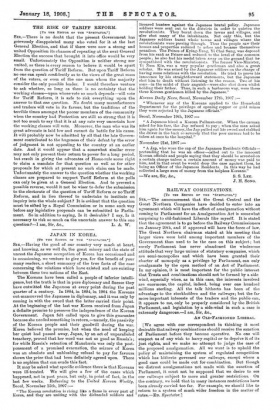RAILWAY COMBINATIONS.
[To THE EDITOR OF THE 'EPROTATOR:j SIR,—The announcement that the Great Central and the Great Northern Companies have decided to enter into an agreement which will have the effect of amalgamation without coming to Parliament for an Amalgamation Act is somewhat surprising to old-fashioned Liberals like myself. It is stated that the agreement is to go before the Railway Cdmmissioners on January 20th, and if approved will have the force of law. The Great Northern chairman stated at his meeting that larger views were held among important members of the Government than used to be the case on this subject; but surely Parliament has never abandoned the wholesome attitude that very large unions of statutory companies, which are semi-monopolies and which have been granted their charter of monopoly as a privilege by Parliament, can only amalgamate by the open method of an Act of Parliament. In my opinion, it is most important for the public interest that Trusts and combinations should not be formed by a side wind, especially when, as in this case, the interests involved are enormous, the capital, indeed, being over one hundred millions sterling. All the talk hitherto has been of the advantage to the stockholders and the railways; but the far more important interests of the traders and the public can, it appears to me, only be properly' considered by the British Parliament, and legislation by a side-wind in such a case is extremely dangerous.—I am, Sir, &c.,
AN OLD-FASHIONED LIBERAL.
[We agree with our correspondent in thinking it most desirable that railway combinations should receive the sanction of Parliament before they become operative. No one will suspect us of any wish to harry capital or to deprive it of its just rights, and we make no attempt to judge the case of the proposed amalgamation. All we want is to uphold the policy of maintaining the system of regulated competition which has hitherto governed our railways, except where a good case could be made out for combination. But though we distrust amalgamations not made with the sanction of Parliament, it must not be supposed that we desire to see our railways subject to more and greater restrictions. On the contrary, we hold that in many instances restrictions have been already carried too far. For example, we should like to return to a system of much wider freedom in the matter of rates.—En. Spectator.]






































 Previous page
Previous page